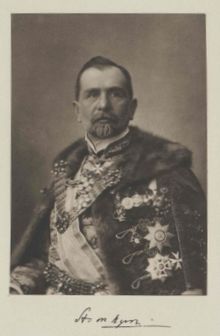Stephan Ugron
Stephan (István) of Ugron to Ábránfalva (* 29. September 1862 in Mezőzáh (now Zau de Campie ), Kingdom of Hungary , † 10. September 1948 in Cluj , Romania ) was an Austro-Hungarian diplomat, 1911-1913 ambassador in Serbia and 1917–1918 envoy in the General Government of Warsaw .
Life
Ugron, a member of a Hungarian magnate family , entered the foreign service in 1886 after graduating from the Oriental Academy . From 1889 to 1891 he served at the Smyrna Consulate , then in Venice, New York, Warsaw and Kiev . From 1896 to 1900 he was the first head of the Austro-Hungarian consulates in Tbilisi , from 1900 to 1901 in Alexandria , from 1902 to 1909 in Warsaw, and from 1909 to 1911 in Bucharest.
Foreign Minister Alois Lexa von Aehrenthal (1906–1912) helped a new generation of young diplomats, including friends Ugron, Friedrich Szápáry , Alexander Hoyos and Leopold Andrian, to influential posts. This generation of diplomats, under Leopold Berchtold , would then also play a decisive role in triggering the First World War .
He was kuk chamberlain, officer of the Franz Joseph Order , knight of the Order of the Iron Crown (3rd class) . From 1911 to 1913 Ugron received the important post of envoy in Belgrade. The emperor gave him the express task of improving tense relations with Serbia. In November 1911 he reported to Vienna about a conspiracy by extremist Serb officers called the Black Hand . In February 1912 he warned against possible cooperation of this group with Serbian authorities.
After the outbreak of war, Ugron took over the management of the Poland department at Ballhausplatz , the then seat of the Foreign Ministry. On January 15, 1917, he and Andrian exchanged positions, Ugron became the representative of the Austro-Hungarian Foreign Ministry in Warsaw, for the German Governor General Hans von Beseler and the government of the reigning kingdom of Poland . There he appeared as a staunch supporter of the Austro-Polish solution , the incorporation of Russian Poland into the Habsburg monarchy . Otherwise, Austria would lose Galicia .
After the end of the war he went back to his homeland in Transylvania , which, however , fell from Hungary to Romania in the Treaty of Trianon . 1923 to 1926 chairman of the Hungarian National Party (Orszägos Magyar Part) in Romania, Ugron also became General Curator of the Reformed Church in Romania in 1930 .
Individual evidence
- ↑ a b Rudolf Agstner (Ed.): 1915/1916. The somewhat different reader on World War I. (= Research on the history of the Austrian Foreign Service , Volume 10), Lit, Münster, 2014, ISBN 978-3-643-50602-3 , p. 259 .
- ^ Rudolf Agstner: Austria in the Caucasus. 1849-1918. Diplomatic Academy, Vienna 1999, ISBN 3-902021-12-8 , p. 33.
- ^ Leopold von Andrian (1875–1951). Correspondence, notes, essays, reports. (= Publications of the Commission for Modern History of Austria 97) Ed. By Ursula Prutsch and Klaus Zeyringer. Böhlau, Vienna 2003, ISBN 3-205-77110-9 , p. 97.
- ^ Dušan A. Lončarević: The Origin of Yugoslavia. Amalthea, Vienna 1929, p. 447.
- ^ Gerhard Hiller: The development of the Austrian-Serbian opposition 1908–1914. (At the same time dissertation, University of Halle-Wittenberg 1934) Akad. Verlag, Halle 1934, p. 35.
- ↑ Christopher Clark : The Sleepwalkers. How Europe moved into World War I. Deutsche Verlags-Anstalt, Munich 2013, ISBN 978-3-421-04359-7 , online .
- ^ Leopold von Andrian (1875–1951). Correspondence, notes, essays, reports. Vienna 2003, p. 237.
- ^ Leopold von Andrian (1875–1951). Correspondence, notes, essays, reports. Vienna 2003, p. 244.
-
^ André Scherer, Jacques Grunewald: L'Allemagne et les problemèmes de la paix pendant la première guerre mondiale. Documents extraits des archives de l'Office allemand des Affaires étrangères. 4 volumes (German original documents), Paris 1962/1978, ISBN 2-85944-010-0 , Volume 4, p. 393 ff (No. 286).
Wolfdieter Bihl (Hrsg.): German sources on the history of the First World War. Darmstadt 1991, ISBN 3-534-08570-1 , p. 468 ff. (Doc. No. 215). - ^ Zsolt K. Lengyel: Political System and Minorities in Romania. Outline of the internal integration problems of the centralized unitary state using the example of the Germans and the Magyars. In: Journal for Transylvanian Cultural Studies. Working group for Transylvania regional studies, Böhlau, 24 (2001), pp. 190–212, here: p. 202.
| predecessor | Office | successor |
|---|---|---|
| Johann Forgách |
Austro-Hungarian envoy to Serbia 1911–1913 |
Wladimir Giesl von Gieslingen |
| personal data | |
|---|---|
| SURNAME | Ugron, Stephan |
| ALTERNATIVE NAMES | Ugron zu Ábránfalva, Stephan von; Ugron to Ábránfalva, István from |
| BRIEF DESCRIPTION | Austro-Hungarian diplomat |
| DATE OF BIRTH | September 29, 1862 |
| PLACE OF BIRTH | Zau de Câmpie , Transylvania |
| DATE OF DEATH | September 10, 1948 |
| Place of death | Cluj-Napoca |

